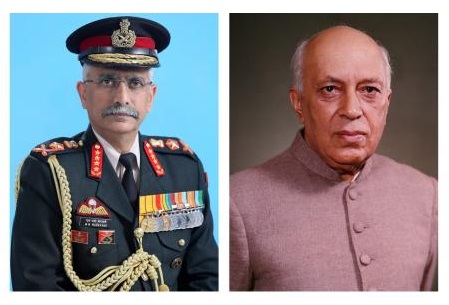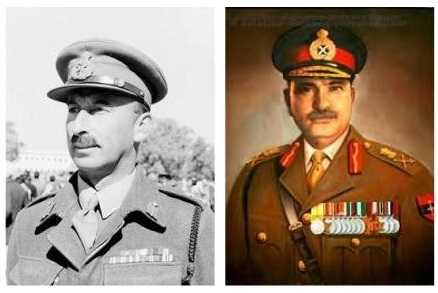Transparency and learning lessons from mistakes once made is no virtue of most countries. Even when after a disaster a commission is installed to find out what went wrong and who was responsible there is a glaring lack of consequences for the people who made the mistakes and for the structures that lead up to the faults. Neither is transparency widely spread. The reports produced by those commissions are mostly not made public so that the institutions and persons responsible don’t get public blame. Transparency has become a popular demand today but it is still not liked by most regimes. But transparency and learning the lessons from mistakes made can help survival.
The lack of transparency in India that is holding on until today is best illustrated by citing the example of the Henderson Brooks Bhagat Report that was written by two officers in the Indian Army: Lieutenant General Henderson Brooks and Brigadier General Premindra Singh Bhagat (Victoria Cross) as an “Operations Review” of the events leading up to the Sino Indian War of 1962. Caused by a border dispute between India and China regarding the exact location of the Mac Mahon Line that served as border between the two states in the north eastern Himalayan region, the ‘Forward Policy’ adopted in 1961 by PM Nehru of setting up new military outposts in disputed areas triggered the 1962 war between India and China which ended in a devastating defeat for India. Over 4,000 were taken prisoner of war which saw an entire division of over 15,000 soldiers retreat ignominiously in the face of the Chinese onslaught in the North East Frontier Agency (NEFA). India’s toll in that short war in the high Himalayas was 1,383 killed, 1,047 wounded and 1,696 missing. Over thousand seeking refuge crossed over to (than) East Pakistan. The war ended when Beijing suddenly called a unilateral ceasefire and ordered its troops to retreat to their previous positions all after dealing India its worst military drubbing.
While publicly India was trying to smooth over its defeat and is until today blaming China to have triggered the war the mentioned commission was installed to find out why the Indian Army that considered itself undefeatable had been defeated so badly. But Nehru’s refusal to countenance Chinese requests to negotiate and his insistence on the ‘Forward Policy’ causing India’s subsequent defeat were documented in excruciating detail later in the book ‘India’s China War’ written by Neville Maxwell and published in 1970.Maxwell had acquired a copy of the report during his investigations. The report was kept top secret for many years and only on 17 March 2014 five decades later Neville Maxwell posted volume 1 of the two volume report on his website. Today it is available for a larger public online though some pages are missing. Marked ‘Top Secret’ on each page the 1963 report is the most severe indictment of independent India’s political and military leadership ever.
In this report General Henderson Brooks held practically the entire civil and military leadership responsible for plunging India into a war it was not prepared for. Neither were enough troops available nor were they provided with warm cloths to survive in the severe cold of high altitude and early winter. Logistics was a problem because roads were not available to secure supplies. They had to be air-dropped and much of the supplies was lost on the long way between the dropping place and the outposts of the soldiers. That resulted in shortage of food, ammunition and other things that undermined the spirit of the soldiers.
Among the names held responsible in the report is Krishna Menon, then Indian Defence Minister: Brooks mentions as ‘surprising’ the defence minister’s decision not to keep minutes to be taken of all the meetings he had with the military leadership ahead of the 1962 War. It led to ‘grave consequences’ he said, because it absolved anyone in the ultimate analysis of the responsibility of any major decision.
The report is scathing in his indictment of DIB Mullick and the Intelligence Bureau for intelligence which was haphazardly collected, badly processed, unimaginatively put across and inefficiently disseminated.It appears that the DIB was of the opinion that the ‘Chinese would not react to our establishing of new posts and that they were not likely to use force against any of our posts even if they were in a position to do so.’ The IB slept through Chinese preparedness on the border.
Lt General BM Kaul, Chief of General Staff and later Commander 4 Corps is named as the main culprit among the military: the report blames him though indirectly for the Indian army’s complete rout in the eastern sector. Brooks castigates Kaul, who as Chief of General Staff set up impossible targets for the troops on the ground. As a lieutenant Kaul was transferred to the Army Supply Corp and till reaching the rank of Brigadier did not command any operational unit of the fighting arms. Infantry, Armour, Artillery and Engineer (combat engineers have a much more difficult note than infantry) Senior Officers must command combat units going up the ladder, but someone from the Supply Corps? Most of his promotions and postings come on the “Brahmin” connection, he was very close to PM Jawahawlal Nehru and was favourite of Defence Minister Krishna Menon. His Divisional Command was spent getting plaudits for himself at the cost of his divisional troops constructing barracks. How he was ever tasked to head an operational corps in a war situation is beyond comprehension?
As the CGS, General Kaul also bought into the government’s myth that the Chinese would not react to the forward policy. In addition, he got himself flown out of the field of operation on health grounds and stayed in Delhi while staying in command an issuing orders from Delhi! In 1968, Brigadier John Dalvi, the former commanding officer of the 7th Infantry Brigade that participated in the 1962 Sino Indian War authored a book named ‘Himalayan Blunder’, where he gave his first hand accounts and perceptions of the causes for India’s defeat in the war. He wrote about Gen Kaul: “He managed to keep himself away from hardship and learning the nuances of a military commander as a junior officer and later in service, managed to grab important Army senior command appointments due to his “pull”. His involvement with Jawaharlal Nehru later turned out to be a major reason for shameful loss and massacre of Indian troops at the hands of the Chinese”. Kaul, being his distant relative, was a favourite of PM Nehru which made Defence Minister V.K. Krishna Menon appoint Kaul as Chief of General Staff, against the advice of the outgoing Chief of Army Staff and in spite of the fact that he was an Army Supply Corps officer, with no prior combat experience having never commanded a fighting unit earlier. Gen Kaul had to resign after the 1962 disaster. Personal “sifarish” obviously caused a humiliating defeat and damaged India’s national interest.

The report is mainly silent on the role played by Prime Minister Jawaharlal Nehru and Army Chief General VM Thapar though it implicitly questions Nehru’s ‘Forward Policy’ by which the Indian army was mandated to move ahead of the 3000 km McMahon Line, separating India and China. Brooks says he does not know the background of the government’s decision because he does not have the minutes of the meeting where the forward policy was laid out. Nehru and Thapar were, ironically, the ones who suffered the most from the debacle while the others had hardly any consequences to suffer. General Thapar resigned as army chief on November 22, 1962, a day after the Chinese announced a ceasefire. Nehru whose forward policy was a strategic blunder, died a broken man two years after the defeat.
The 1962 war is not just an unfortunate and short lived episode in Indian history. The causes and consequences of that war live on in New Delhi’s stance about the disputed borders, its fears about a rising China and in the continuing inadequacies in the organisation of India’s military and strangle India’s international and regional position.
For five decades India fighting the cheapest proxy war in history against Pakistan using Afghanistan as a platform, first using Afghan and Russian lives and money to go with the destruction of Afghanistan, and then Afghan lives and American lives and money, continuing with Afghanistan’s destruction, is coming to an end. With the geo political situation in the region taking a dramatic turn because of the Bollywood hype created, will the India public and media succeed in goading the Indian Govt etc. sending the Indian Army into battle with the Chinese in a war that India is bound to lose? The Indians have learnt little from the Henderson Bhagat Report
Contributed By:

Dr. Bettina Robotka
Dr Bettina Robotka, former Professor of South Asian Studies, Humboldt University, Berlin.




